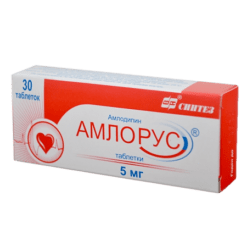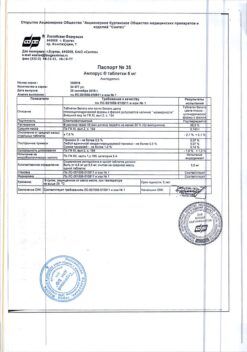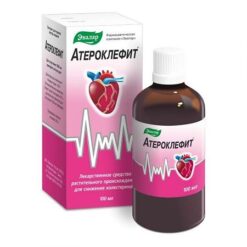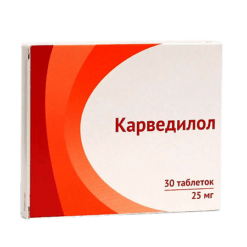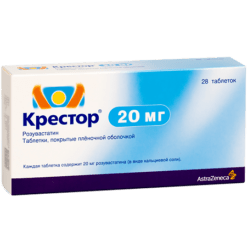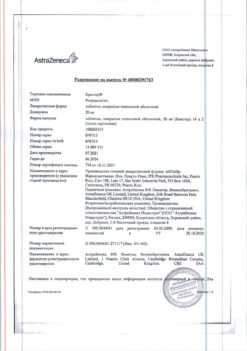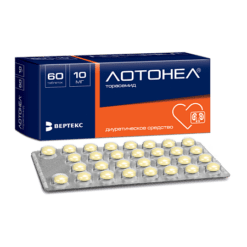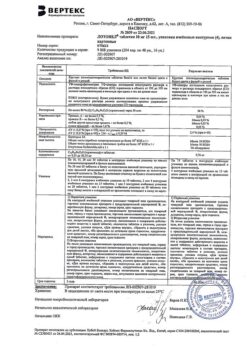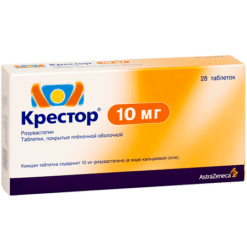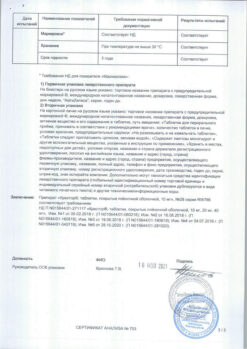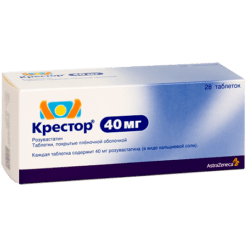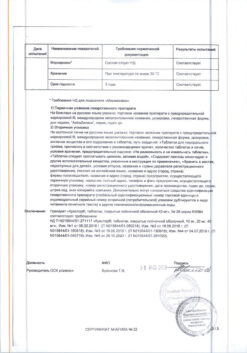No products in the cart.
Aritel Cor, 2,5mg 30 pcs.
€1.00
Out of stock
(E-mail when Stock is available)
Description
A selective beta1-adrenoblocker with no sympathomimetic activity of its own, has no membrane stabilizing effect. It has only a slight affinity to beta2-adrenoreceptors of bronchial and vascular smooth muscle, as well as to beta2-adrenoreceptors involved in the regulation of metabolism.
Hence, bisoprolol generally has no effect on airway resistance and metabolic processes in which beta2-adrenoreceptors are involved. As a rule, maximum reduction of arterial blood pressure (BP) is achieved 2 weeks after initiation of therapy.
Bisoprolol reduces sympathoadrenal activity by blocking the beta1-adrenoreceptors of the heart.
On single oral administration of Aritel Cor in patients with coronary heart disease without signs of chronic heart failure (CHF), bisoprolol decreases heart rate (HR), decreases blood stroke volume and consequently decreases myocardial ejection fraction and oxygen demand.
In long-term therapy, initially increased total peripheral vascular resistance (TPR) decreases. Reduction of plasma renin activity, is considered as one component of the hypotensive effect of beta-adrenoblockers.
Indications
Indications
Active ingredient
Active ingredient
Composition
Composition
How to take, the dosage
How to take, the dosage
The tablets of Aritel® Cor should be taken once a day with a small amount of liquid, in the morning before, during or after breakfast.
The tablets should not be chewed or crushed into a powder.
Cronic Heart Failure
The initiation of treatment of chronic heart failure with Aritel® Cor requires a special titration phase and regular medical monitoring.
The precondition for treatment with Aritel® Cor is stable chronic heart failure without signs of exacerbation.
The treatment of chronic heart failure with Aritel® Cor is initiated according to the following titration schedule.
The recommended starting dose is 1.25 mg (1/2 tablet of 2.5 mg) once daily. Individual adaptation of the patient to the prescribed dose should be monitored. The dose should be gradually increased to 2.5 mg, 3.75 mg, 5 mg, 7.5 mg and 10 mg once daily, depending on individual tolerance. Each subsequent dose increase should be carried out after at least two weeks.
If the increase in dose is not well tolerated by the patient, the dose may be reduced.
The maximum recommended dose in chronic heart failure is 10 mg of Aritel® Cor once daily.
While titration it is recommended to control BP, HR and degree of severity of symptoms of chronic heart failure at regular intervals. Worsening of symptoms of chronic heart failure is possible from the first day of using the drug.
If the patient does not tolerate the maximum recommended dose of the drug, a gradual dose reduction is possible.
During or after the titration phase, a temporary worsening of the course of chronic heart failure, arterial hypotension or bradycardia may occur. In this case it is recommended first of all to correct doses of drugs of concomitant therapy. It may also be necessary to temporarily reduce the dose of Aritel® Cor or discontinue it.
After the patient’s condition has stabilized, re-titration should be performed or treatment should continue.
Arial hypertension and stable angina
In all cases, the regimen and dosage are adjusted by the physician for each patient individually, particularly considering the heart rate and the patient’s condition.
The usual starting dose is 5 mg of bisoprolol once daily. If necessary, the dose may be increased to 10 mg once daily. In the treatment of arterial hypertension and stable angina pectoris the maximum recommended dose is 20 mg bisoprolol once daily.
Duration of treatment for all indications
Treatment with Aritel® Cor is usually a long-term therapy.
Interaction
Interaction
Not recommended combinations:
Hypotensive agents of central action (such as clonidine, methyldopa, moxonidine, rilmenidine) may lead to a slower HR and decreased cardiac output as well as to vasodilation due to a decrease in central sympathetic tone. Abrupt withdrawal, especially prior to beta-adrenoblocker withdrawal, may increase the risk of “ricochet” arterial hypertension.
Combinations requiring special caution:
Special Instructions
Special Instructions
Do not abruptly interrupt treatment with the drug or change the recommended dose without first consulting your doctor, as this may cause a temporary deterioration in heart function.
The treatment should not be stopped abruptly, especially in patients with coronary heart disease. If discontinuation of treatment is necessary, the dose should be reduced gradually.
Contraindications
Contraindications
Side effects
Side effects
The frequency of adverse reactions listed below was determined as follows: very often, 1/10; often, 1/100; infrequently, 1/1000; rarely, 1/10,000; very rarely, from 1/10,000.
From the central nervous system:often: dizziness*, headache*; rarely: loss of consciousness.
General disorders:often: asthenia (in patients with CHF), increased fatigue*; infrequent: asthenia (in patients with arterial hypertension or angina pectoris).
Psychiatric disorders: infrequently: depression, insomnia; rarely: hallucinations, nightmares.
Overlooking organ: rare: decreased lacrimation (to be considered when wearing contact lenses); very rare: conjunctivitis.
Hearing organ: rarely: hearing disorders.
Cardiovascular system disorders:very common: bradycardia (in patients with CHF); common: worsening of symptoms of CHF course (in patients with CHF), feeling of coldness and numbness in extremities, marked BP reduction, especially in patients with CHF; infrequent: arrhythmia; bradycardia (in patients with arterial hypertension or angina pectoris); worsening of symptoms of CHF (in patients with arterial hypertension or angina pectoris), orthostatic hypotension.
Respiratory system disorders: infrequent: bronchospasm in patients with bronchial asthma or airway obstruction in history; rare: allergic rhinitis.
Gastrointestinal tract: frequently: nausea, vomiting, diarrhea, constipation; rarely: hepatitis.
Muscular system disorders: infrequently: muscle weakness, muscle cramps.
Skin disorders: frequently: hypersensitivity reactions such as skin itching, rash, skin hyperemia; very rarely: alopecia. Beta-adrenoblockers may contribute to exacerbation of psoriasis symptoms or cause psoriasis-like rash.
Reproductive system disorders: rarely: impaired potency.
Laboratory findings: rarely: increased triglyceride concentration and activity of “hepatic” transaminases in the blood (aspartate aminotransferase (ACT), alanine aminotransferase (ALT)).
* In patients with arterial hypertension or angina pectoris these symptoms usually appear at the beginning of therapy, are mild and disappear within 1-2 weeks after therapy start.
Overdose
Overdose
Symptoms:
The most common symptoms of overdose are AV blockade, bradycardia, decreased BP, bronchospasm, acute heart failure and hypoglycemia.
Treatment:
In the event of an overdose, the first step is to discontinue the drug and begin supportive symptomatic therapy.
In case of marked bradycardia: intravenous administration of atropine. If the effect is insufficient, a drug with a positive chronotropic effect may be administered with caution. Sometimes a temporary artificial pacemaker may be necessary.
In case of marked BP decrease: intravenous administration of plasma replacement solutions and administration of vasopressors.
In AV blockade:patients should be constantly monitored, and treated with alpha- and beta-adrenomimetics, such as epinephrine. If necessary, an artificial pacemaker should be placed.
In case of exacerbation of the course of CHF: intravenous administration of diuretics, drugs with positive inotropic effect, and vasodilators.
In bronchospasm:the use of bronchodilators, including beta2-sympathomimetics and/or aminophylline.
In hypoglycemia: intravenous dextrose (glucose).
Pregnancy use
Pregnancy use
During pregnancy, Aritel® Cor should be recommended for use only if the benefit to the mother outweighs the risk of fetal side effects. As a rule, beta-adrenoblockers reduce blood flow in the placenta and may affect fetal development.
The blood flow in the placenta and uterus should be monitored, and the growth and development of the unborn child should be monitored; in case of adverse events in relation to pregnancy and/or fetus, alternative therapies should be taken. The newborn should be carefully examined after delivery. In the first three days of life, symptoms of hypoglycemia and bradycardia may occur.
There are no data on excretion of bisoprolol into breast milk. Therefore, the use of Aritel® Cor is not recommended for women during breast-feeding. If it is necessary to take Aritel® Cor during lactation, breastfeeding should be stopped.
Similarities
Similarities
Additional information
| Weight | 0.020 kg |
|---|---|
| Shelf life | 2 years. |
| Conditions of storage | In a dry, light-protected place at a temperature not exceeding 25 °C. |
| Manufacturer | Kanonfarma Production ZAO, Russia |
| Medication form | pills |
| Brand | Kanonfarma Production ZAO |
Related products
Buy Aritel Cor, 2,5mg 30 pcs. with delivery to USA, UK, Europe and over 120 other countries.



